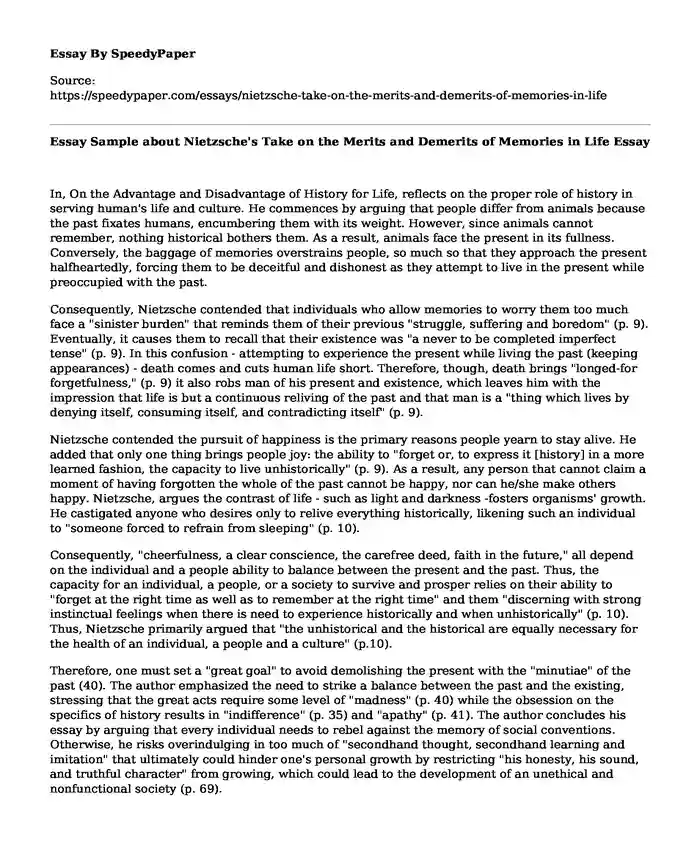In, On the Advantage and Disadvantage of History for Life, reflects on the proper role of history in serving human's life and culture. He commences by arguing that people differ from animals because the past fixates humans, encumbering them with its weight. However, since animals cannot remember, nothing historical bothers them. As a result, animals face the present in its fullness. Conversely, the baggage of memories overstrains people, so much so that they approach the present halfheartedly, forcing them to be deceitful and dishonest as they attempt to live in the present while preoccupied with the past.
Consequently, Nietzsche contended that individuals who allow memories to worry them too much face a "sinister burden" that reminds them of their previous "struggle, suffering and boredom" (p. 9). Eventually, it causes them to recall that their existence was "a never to be completed imperfect tense" (p. 9). In this confusion - attempting to experience the present while living the past (keeping appearances) - death comes and cuts human life short. Therefore, though, death brings "longed-for forgetfulness," (p. 9) it also robs man of his present and existence, which leaves him with the impression that life is but a continuous reliving of the past and that man is a "thing which lives by denying itself, consuming itself, and contradicting itself" (p. 9).
Nietzsche contended the pursuit of happiness is the primary reasons people yearn to stay alive. He added that only one thing brings people joy: the ability to "forget or, to express it [history] in a more learned fashion, the capacity to live unhistorically" (p. 9). As a result, any person that cannot claim a moment of having forgotten the whole of the past cannot be happy, nor can he/she make others happy. Nietzsche, argues the contrast of life - such as light and darkness -fosters organisms' growth. He castigated anyone who desires only to relive everything historically, likening such an individual to "someone forced to refrain from sleeping" (p. 10).
Consequently, "cheerfulness, a clear conscience, the carefree deed, faith in the future," all depend on the individual and a people ability to balance between the present and the past. Thus, the capacity for an individual, a people, or a society to survive and prosper relies on their ability to "forget at the right time as well as to remember at the right time" and them "discerning with strong instinctual feelings when there is need to experience historically and when unhistorically" (p. 10). Thus, Nietzsche primarily argued that "the unhistorical and the historical are equally necessary for the health of an individual, a people and a culture" (p.10).
Therefore, one must set a "great goal" to avoid demolishing the present with the "minutiae" of the past (40). The author emphasized the need to strike a balance between the past and the existing, stressing that the great acts require some level of "madness" (p. 40) while the obsession on the specifics of history results in "indifference" (p. 35) and "apathy" (p. 41). The author concludes his essay by arguing that every individual needs to rebel against the memory of social conventions. Otherwise, he risks overindulging in too much of "secondhand thought, secondhand learning and imitation" that ultimately could hinder one's personal growth by restricting "his honesty, his sound, and truthful character" from growing, which could lead to the development of an unethical and nonfunctional society (p. 69).
Reference
Nietzsche, F. (1980). On the advantage and disadvantage of history for life. Hackett Publishing.
Cite this page
Essay Sample about Nietzsche's Take on the Merits and Demerits of Memories in Life. (2022, Feb 24). Retrieved from https://speedypaper.com/essays/nietzsche-take-on-the-merits-and-demerits-of-memories-in-life
Request Removal
If you are the original author of this essay and no longer wish to have it published on the SpeedyPaper website, please click below to request its removal:
- Free Essay with the SWOT Analysis and the STP Analysis of Amazon Go
- Essay Sample: Suggestions for Artworks to Be Added to the Museum Collection
- Free Essay with Walmart's Vision and Mission Statement Evaluation
- Free Essay Sample on Software, Movies and Music Privacy
- Case Study Paper Example on Body Modification of Maria Jose Cristerna
- Pepsi Co. History, Free Essay about the Company
- Free Essay: Mental Health a Major Concern Among the Youth Today
Popular categories





